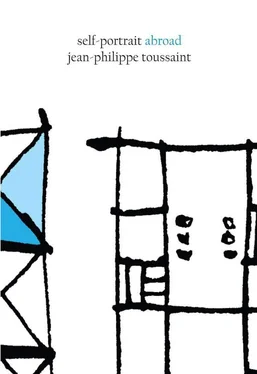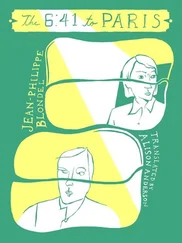I didn’t get much chance to improve my German in Kyoto. A few weeks after I arrived I had a visit from my friend Romano Tomasini, a violinist with the Berlin Philharmonic Orchestra (of Italian origin, Romano is actually from Luxembourg, but we generally speak French when we’re together). After visiting a few temples Romano proposed we drop in on an acquaintance of his (a German painter married to a Japanese woman, who’d settled in Japan thirty or so years ago) whom he’d met a few years earlier in a lounge at an international airport, their two flights being late, or his only, no matter. Romano had called his friend that morning, who had suggested we pass by his place that afternoon. Equipped with an address written in kanji on a visiting card, we hailed a taxi and got in, showing the visiting card of this Hans-Joachim von R. to the white-gloved driver at the wheel with whom we spoke for a moment (in Japanese, then in English — Romano tried German and Italian but didn’t bother with Luxembourgish) before getting back out: the driver couldn’t quite see what we were getting at. I then suggested that Romano call his friend to ask for more detailed information about his address and, having done so, now armed with an incontestable open sesame (the name of a temple), we caught another taxi whose driver set the meter and started off without a moment’s hesitation.
We drove along for about an hour in Kyoto, then left the metropolitan area and started toward the mountains that surround the city, heading off along the hillside, the meter now indicating over six thousand yen. Finally the taxi stopped in front of what looked like an abandoned carpentry workshop with a large open shed alongside a pathway. Long narrow strips of rough wood prickly with shavings were fixed to workbenches inside, and a carpet of sawdust as fine as autumn moss covered the ground. The driver turned around to say something that, despite my modest trilingualism and Romano’s diverse linguistic talents, we couldn’t understand. Romano nodded his head affirmatively and once more showed him Hans-Joachim von R.’s finely embossed visiting card over the seat. The driver examined the visiting card attentively and finally got out of the taxi. He wandered along the street for a few moments before asking a woman for directions, after which he got back into the car with a skeptical look, did a U-turn and drove slowly along the side of the road for a few minutes more before pulling up onto the sidewalk and turning off the motor. There, the visiting card in his hand, he picked up the car telephone and dialed Hans-Joachim von R.’s number. It rang once, twice, then connected, and we heard Hans-Joachim von R.’s distant voice saying in German something like: “We’re not in right now, but you can leave a message after the beep.” Beeep.
We’d left the cab and had been walking for some time along a deserted road when, coming up to an abandoned intersection, we were witness to a radically bizarre and silent scene. In the middle of the street, down on the asphalt, there was a racing cyclist in a pair of tight-fitting black cycling shorts and a shiny pink polyester jersey with a blue and white pattern. Beside him on the ground was a twisted racing bike, and beside that a car had come to a stop at right angles to the traffic, a perfectly normal car of which all we could see was a bit of the front end, slightly damaged, one broken light bearing solitary witness to the accident. There was no other damage, nothing but a small heap of tiny glass fragments lying on the road. The most astonishing thing about the scene was the absolute stillness of the central figure, the cyclist, not lying on the road but sitting in despair in the middle of the intersection like a tableau vivant, his two hands on his neck, like an apocryphal image of the sufferings of Christ. More or less at the same time, getting louder in the silence, the echoes of an ambulance siren could be heard far off, which, by I know not what perfect spatiotemporal coincidence, pulled up and parked right in front of me the moment I was about to cross the road, even blocking my view of Romano for an instant, who, in a manner less Nipponese than Neapolitan, had rushed over and knelt down beside the injured cyclist to find out how he was. I could see him talking in a low voice (in Italian?), one hand on the cyclist’s shoulder, softly stroking his head to comfort him, while a bit further off a uniformed policeman stuffed the twisted racing bike into a large transparent plastic bag with the help of a gloved assistant. I walked around the ambulance while the stretcher bearers, after asking the few onlookers to make room, carefully lifted the cyclist, still mummified in his sitting position, set him on a stretcher and carried him off precariously balanced like a figurine in a Holy Week procession, before loading him into the back of the ambulance. Romano crossed the street once more amid the glass debris and posted himself at the angle of the intersection, where I saw him suddenly lift his thumb to hitch-hike as the next car drove by. I don’t know if it was because of the red light or the ambulance (in any case you’re guaranteed success if you hitch-hike in front of an ambulance), nevertheless the car screeched to a halt in front of him and I saw Romano lean in the window and talk to the driver, holding Hans-Joachim von R.’s finely embossed little visiting card in his hand. After a moment he opened the rear door and turned toward me, beckoning for me to come over. I trotted across the road and got into the car, sliding over the back seat as far as an empty baby seat would let me, and nodded politely to the young couple up front. The car started off and we raced after the ambulance, escorted by two police motorcyclists who cleared the way. Sitting in the back of the car I didn’t say a thing, somewhat embarrassed to impose on the kindness of this couple and to use Japanese public funds to get an escort to the house of this Hans-Joachim von R. (who wasn’t at home, it turned out).
nara, historic capital of japan
Sitting with Professor H. in one corner of the covered café terrace opposite the main entrance to the Nara train station, we kept our eyes peeled for the three people we were supposed to meet. Like a couple of cops on a stakeout, in front of the large window, an old Japan Times spread casually out in front of us, we turned our spoons slowly in our cups while casually glancing down the esplanade which bustled with hundreds of people, trying to pick out Charlie or Rémi in the crowd, while I vaguely tried to picture the young woman Professor H. wanted to introduce me to (an admirer, he’d told me, which augured well).
A passionate Francophile and skillful go-between, Professor H. had planned to get the five of us together that day at Nara to take in the city’s traditional holiday, On matsuri , the last preparations for which were just underway: a couple of guys in fundoshi and long blue socks bearing the colors of their brotherhood scuttled across the esplanade with wooden rams in their hands to catch up with a procession that had just departed. Our quintet finally assembled, we hastily introduced ourselves to one another under a driving rain and left the station to go take up a position at the top of a sloped street where we waited for the procession to arrive, Rémi and Professor H. under a huge black umbrella, Charlie and my admirer squeezed together under a smaller transparent one, and myself a little to one side, my hands in my pockets, head down, my black wool hat pulled over my ears. Soon the first horsemen appeared, followed by a long silent procession bearing immense warlike standards that twirled in the wind and sagged under the rain. Unfathomable samurai in damascened armor filed slowly by, followed by hundreds of extras dressed in sumptuous costumes, pleated blue and lilac silks that the rain pressed against their bodies. Soaked and heavy, the tissue finally shed its colors bit by bit, which trickled down into the gutters in blue and white rivulets. Immobile, my collar pulled up around my neck, a few raindrops dribbling down my nose and cheeks, I watched the last breathless figures walking up the street in their soaking sandals, bent double under a torrential rain which became stronger and stronger, a thick, heavy, driving rain like a mobile wall of water that the wind spun in whirls under the stormy black sky; children of around three or four with swords at their belts whose mothers trotted along beside them, all tangled up in their drenched kimonos, trying to cover them with umbrellas blown inside-out in the gusts of wind; stoic, impassive old men on horseback with hundred-year-old stable-boys clutching the reins in both hands, when suddenly the animal bucked in the street in an effort to free itself, whinnying up at the storm, shrieking its rage at the inclement skies (too bad it’s raining, huh? I said, leaning over to Professor H.).
Читать дальше












